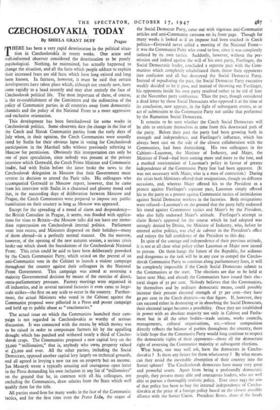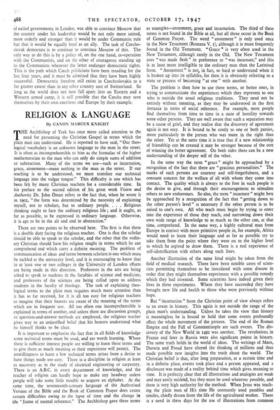CZECHOSLOVAKIA TODAY
By SHIELA GRANT DUFF Prague
THERE has been a very rapid deterioration in the political situa- tion in Czechoslovakia in recent weeks. One acute and well-informed observer considered the deterioration to be purely psychological. Nothing, he maintained, has actually happened to change the situation, and all the facts which people adduce to explain their increased fears are old facts which have long existed and long been known. In fairness, however, it must be said that certain developments have taken place which, although not exactly new, have come rapidly to a head recently and may alter entirely the face of Czechoslovak political life. The most important of these, of course, is the re-establishment of the Comintern and the redirection of the policy of Communist parties in all countries away from democratic channels and the policy of the National Front to a more aggressive and exclusive orientation.
This development has been foreshadowed for some weeks in Czechoslovak politics. Some observers date the change in the line of the Czech and Slovak Communist parties from the early days of July when, in their opinion, the Czech Communists were soundly rated by Stalin for their obvious lapse in voting for Czechoslovak participation in the Marshall talks without previously referring to Moscow for permission. Obviously this interpretation can only be one of pure speculation, since nobody was present at the private interview which Gottwald, the Czech Prime Minister and Communist leader, had with Stalin before the latter broke the news to the Czechoslovak delegation in Moscow that their Government must reverse its decision to attend the Paris talks. His colleagues who accompanied Gottwald to Moscow report, however, that he came from his interview with Stalin in a chastened and gloomy mood and that, in the succeeding days of deliberation between Moscow and Prague, the Czech Communists were prepared to impose any public humiliation on their country as long as Moscow was appeased.
Except for the spreading of a mood of alarm and despondency— the British Consulate in Prague, it seems, was flooded with applica- tions for visas to Britain—the Moscow talks did not have any imme- diate repercussion on Czechoslovak internal politics. Parliament went into recess, and Ministers dispersed on their holidays—many of them abroad—in a perfectly normal manner. On the morrow, however, of the opening of the new autumn session, a serious crisis broke out which shook the foundations of the Czechoslovak National Front. This crisis could be said to have been deliberately provoked by the Czech Communist Party, which seized on the pretext of an anti-Communist vote in the Cabinet to launch a violent campaign throughout the country against their colleagues in the National Front Government. This campaign was aimed at reversing a majority Governmental decision by means of the exercise of direct, extra-parliamentary pressure. Factory meetings were organised in all industries, and in several national factories it even came to large- scale strikes—the first on any scale to occur in the country. Further- more, the actual Ministers who voted in the Cabinet against the Communist proposal were pilloried in a Press and poster campaign and held up to public abuse as "reactionaries."
The actual issue on which the Communists launched their cam- paign is not regarded in Czechoslovakia as worthy of serious discussion. It was connected with the means by which money was to be raised in order to compensate farmers hit by the appalling drought which has parched and withered nearly a third of Czecho- slovak crops. The Communists proposed a new capital levy on the 35,000 "millionaires," that is, anybody who owns property valued at £5,000 and over. All the other parties, including the Social Democrats, opposed another capital levy largely on technical grounds, and all agreed in levying a new tax not on property but on income. Jan Masaryk wrote a typically amuSing and courageous open letter to the Press demanding his own inclusion in any list of "millionaires" on the grnund that he, in common with all, his colleagues, not excluding the Communists, draw salaries from the State which well qualify them for the title.
All parties stood firm for many weeks in the face of the Communist tactics, and for the first time even the Provo Lidu, the organ of the Social Democrat Party, came out with vigorous anti-Communist articles and anti-Communist cartoons on its front page. Though for many weeks it looked as if an impasse had been reached in Czech politics—Gottwald never called a meeting of the National Front— it was the Communist Party who stood to lose, since it was completely isolated by its own tactics. Suddenly, however, without the per- mission and indeed against the will of his own party, Fierlinger, the Social Democratic leader, concluded a separate pact with the Com- munists which completely rehabilitated them, threw their opponents into confusion and all but destroyed the Social Democrat Party. Instead of repudiating the pact, the Social Democrat Party executive weakly decided to let it pass, and instead of throwing out Fierlinger, his opponents inside his own party resolved rather to be rid of him at the November party conference. Thus the pact, though considered a dead letter by those Social Democrats who opposed it at the time of its conclusion, now appears, in the light of subsequent events, as an act of submission to the Communist Party not unlike that performed by the Rumanian Social Democrats.
It remains to be seen whether the Czech Social Democrats will be able to extricate themselves in time from this downward path of the party. Before their pact the party had been growing both in strength and independence, and Fierlinger's influence, which has always been cast on the side of the closest collaboration with the Communists, had been diminishing. His two colleagues in the Cabinet—Lausman, the Minister of Industry, and Majer, the Minister of Food—had been coming more and more to the fore, and a marked reorientation of Lausman's policy in favour of greater independence of the Communist Party line had been apparent. (It was not, necessary with Maier, who is a man of conviction.) During the crisis both Ministers offered their resignations, though on different occasions, and, whereas Majer offered his to the President as a protest against Fierlinger's separate pact, Lausman simply offered his to the party as a protest against Communist tactics of intimidation against Social Democrat workers in the factories. Both resignations were refused—Lausman's on the ground that the party fully endorsed his stand against Communist tactics and Majer's by the President, who also fully endorsed Majer's attitude. Fierlinger's attempt to claim Benes's approval for the course which he had adopted was strongly denied by Drtina, the Minister of Industry, who, before he entered active politics, was chef de cabinet in the President's office and enjoys the full confidence of the President to this day.
In spite of the courage and independence of their previous attitude, it is not at all clear what policy either Lausman or Majer now intend to pursue. On them hangs the future of the Republic, for arduous and dangerous as the task will be in any case to compel the Czecho- slovak Communist Party to continue along parliamentary lines, it will be completely impossible if the Czech Social Democrats submit to the Communists at the start. The elections are due to be held at latest next May, and already the Communists have issued their elec- toral slogan of 51 per cent. Nobody believes that the Communists, by themselves and by ordinary democratic means, could possibly increase their present electoral strength of 37 per cent—they have 40 per cent in the Czech districts—to that figure. If, however, they can succeed either in destroying or in absorbing the Social Democrats, their electoral target becomes a possibility. Once they are established in power with an absolute majority not only in Cabinet and Parlia- ment but in all the other bodies--trade unions, works councils, managements, cultural organisations, etc.—whose composition directly reflects the balance of parties throughout the country, there is little hope that the Communist Party would long continue to respect the• democratic rights of their opponents—above all the democratic right of reversing the Communist majority at subsequent elections.
What hope, one may well ask, have the democrats in Czecho- slovakia? Is there any future for them whatsoever ? By what means can they avoid the inevitable absorption of their country into the Soviet sphere? The Czechoslovak democrats have many very great and powerful assets. Apart from being a profoundly democratic people, they possess many able and courageous leaders, who are well able to pursue a thoroughly realistic policy. Ever since 1943 the aim of that policy has been to buy the internal independence of Czecho- slovakia at the price of a foreign policy based on the closest possible alliance with the Soviet Union. President Benes, alone of the heads
of exiled governments in London, was able to convince Moscow that the country under his leadership would be not only more united, more orderly and stronger than it would be under Communist rule but that it would be equally loyal as an ally. The task of Czecho- slovak democrats is to continue to convince Moscow of this. The only way to do this is by a policy of, on the one hand, co-operation with the Communists, and on the other of courageous standing up to the Communists wherever the latter endanger democratic rights. This is the path which Czech politicians have been treading for the last four years, and it must be admitted that they have been highly successful. Democratic freedom still exists in Czechoslovakia to a far greater extent than in any other country east of Switzerland. So long as the world does not now fall apart into an Eastern and a Western armed camp, it is still possible that the Czechs may save themselves by their own exertions and Europe by their example.



































 Previous page
Previous page